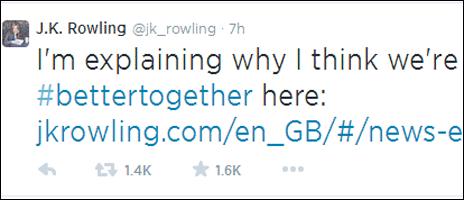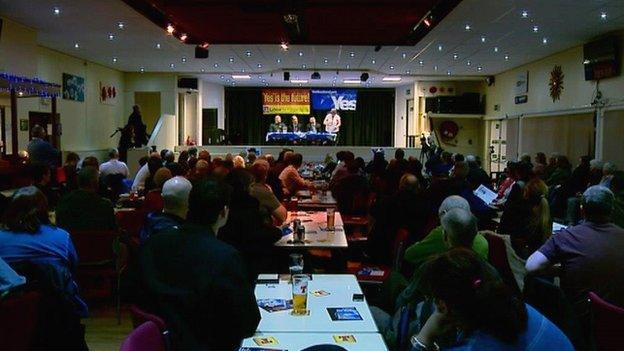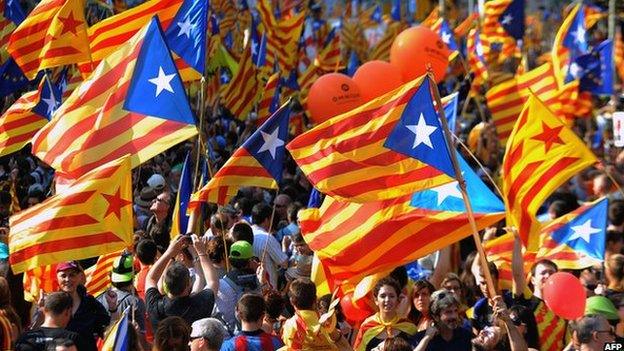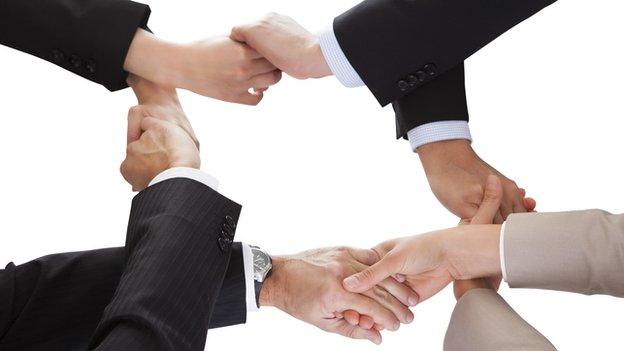Scottish independence: A civilised debate?
- Published
Concerns over the nature and quality of the Scottish referendum debate have been thrust into the spotlight in the wake of the online abuse directed at author JK Rowling and carers' rights campaigner Clare Lally.
Ms Rowling was described as a "bitch" and Ms Lally a "liar, a quisling and a collaborator" on Twitter after both gave their support to the pro-UK Better Together campaign.
It followed Better Together head Alistair Darling's recent interview with the New Statesman magazine, in which he likened Scottish First Minister Alex Salmond to former North Korean dictator Kim Jong-il.
So how does all of that fit with the recent claim by the presiding officer of the Scottish Parliament, Tricia Marwick, that the independence debate was an "inspiration to countries throughout the world"?


Ms Rowling was abused on Twitter donating £1m to Better Together
Anti-social media
The recent online attacks on JK Rowling and Clare Lally have perhaps become the most the most high-profile examples of online trolls on one side of the debate targeting supporters of the other side.
Ms Rowling's donation of £1m to the pro-UK Better Together campaign led to her being described as a "bitch" in a tweet by the Dignity Project charity, which carries out work to improve the lives of children in Africa. The charity later claimed its account had been "hacked".
And Ms Lally, who has a disabled daughter, said she was targeted by so-called "cybernats" after she spoke at a Better Together rally on Monday.
There have also been calls on Twitter for boycotts of businesses that have come out against independence, which has led the pro-UK side to argue that the nationalists were attempting to "shut down debate".
But supporters of the union have also been responsible for directing personal abuse at prominent nationalist figures.
On Wednesday, for example, a man was fined in court for sending an abusive message on Facebook to David Kerr, a former BBC Scotland journalist and SNP candidate for the Scottish Parliament.
And the unflattering language has not been confined to social media, with Better Together head Alistair Darling last week comparing Scottish First Minister Alex Salmond to former North Korean dictator Kim Jong-il in an interview with the New Statesman
Mr Darling was also accused by pro-independence supporters of appearing to agree that the SNP was guilty of "blood-and-soil" nationalism - a term that has become associated with Nazi Germany. Mr Darling denies the claim.
And in April, lottery winners Colin and Chris Weir - who have donated more than £5m of their £161m jackpot to the independence movement - said they had been "smeared" by an article published in the Scottish Daily Mail newspaper.


The referendum debate has seen the return of old-fashioned town hall politics to Scotland
But..?
The issue of online trolling, as upsetting as it is for its victims, is hardly confined to Scotland. Search Twitter for the name of virtually any high-profile public figure and the chances are someone somewhere will have have written something nasty about them.
And it must be remembered that not everyone on Twitter is spouting abuse - after JK Rowling announced her donation to Better Together, several nationalists defended the author's right to get involved in the debate and criticised the abuse she was receiving.
But what is remarkable about the independence debate is how the bile and venom which is too often found online has failed to spill over into the streets.
The referendum campaign has seen grassroots political activity rise to a level that not been seen in Scotland for decades, with hundreds of meetings and debates held in halls and community centres the length and breadth of the country.
But there have been very few reports of trouble, with the small number of mass rallies or protests that have been held also passing off without any disorder.
When hundreds of nationalist activists recently gathered in Glasgow to protest about perceived BBC bias in the referendum campaign, for example, they stood with their hands over their mouths in a silent protest.
And when tens of thousands took part in the annual Rally For Independence in Edinburgh last year, they covered their faces with nothing more sinister than face paint and smiles.


Many Catalans are envious of the Edinburgh Agreement, which committed both the UK and Scottish governments to respecting the outcome of the Scottish independence referendum
Seeing ourselves as others see us
While many Scots caught up in the midst of the referendum campaign may despair at some of the things they see and hear, it seems the debate is being seen in a much more flattering light from further afield.
Earlier this year, Catalan President Artur Mas admitted he was "jealous" of what was happening in Scotland.
He pointed out that the Scottish referendum was taking place with the full support and agreement of both sides, while the Spanish government was refusing to accept the legitimacy of a similar vote in Catalonia.
And in May, former Northern Irish First Minister Lord Trimble told BBC Radio's Good Morning Scotland programme that a "Yes vote in Scotland would reinforce the argument against violence because it's a demonstration of how you can achieve major change through the political democratic process".
Foreign journalists covering the Scottish referendum have also commented on the peaceful nature of the debate, with Indian reporter Dilip D'Souza asking: "Can we learn from Scotland and the UK? As far as I can tell, the question of Scottish independence has always only been debated politically. No British military presence on the streets of Edinburgh and Glasgow, certainly. No hostile face-off with a neighbour".


Politicians on both sides have stressed the importance of putting differences aside after the referendum
A nation divided?
The online abuse and polarised debate has led several commentators to ponder whether Scotland will be left badly divided after the referendum.
But the Edinburgh Agreement, which was signed by both Mr Salmond and Prime Minister David Cameron last year, commits both sides to respecting the outcome of the referendum and working together in the best interests of the Scottish people.
Senior figures on either side of the argument have already stressed the need for reconciliation after 18 September.
And the Church of Scotland has said it will hold a special "healing" service in Edinburgh on the Sunday following the referendum, with politicians from both sides expected to attend in a symbolic display of unity and respect.
As Ms Marwick pointed out in a recent BBC interview: "In 1979 when Scotland voted for an assembly and it was denied, people came together.
"In 1997 there were Conservatives who were passionately opposed to the creation of a Scottish Parliament. The coming together that we saw after both of these referendums, we will see again. I am absolutely confident of that."